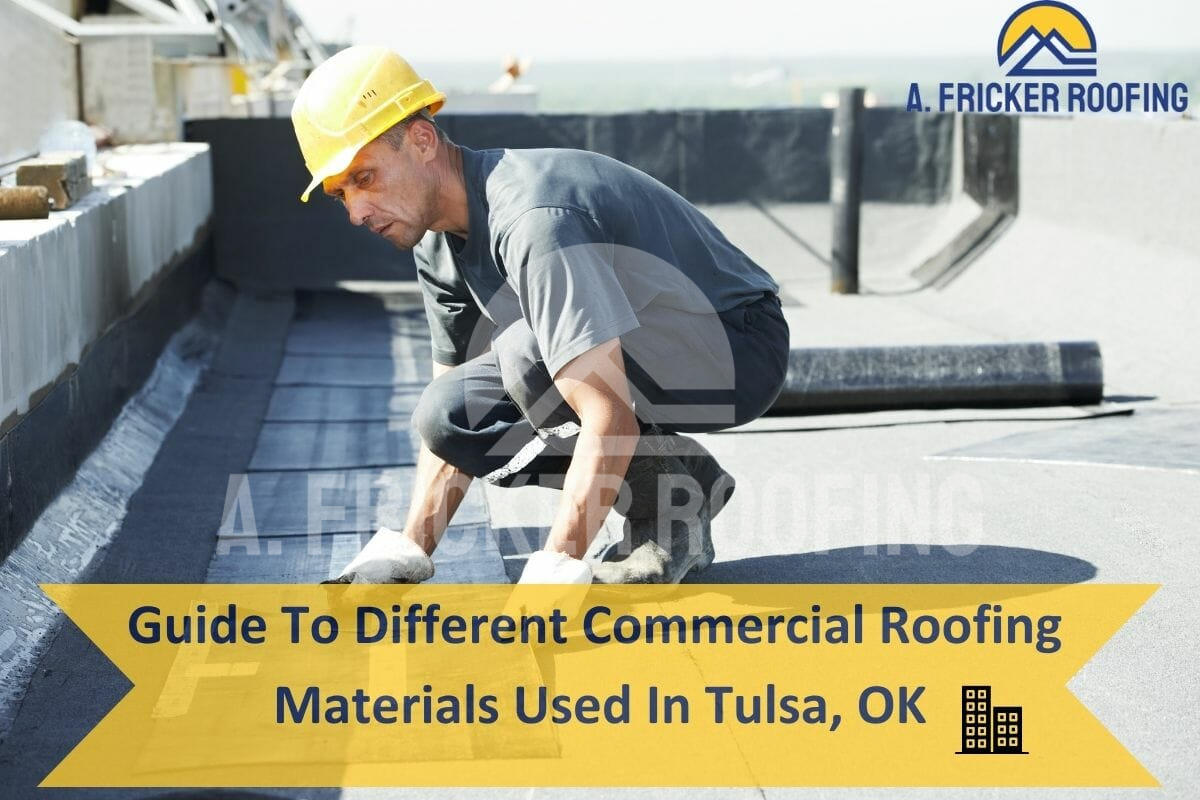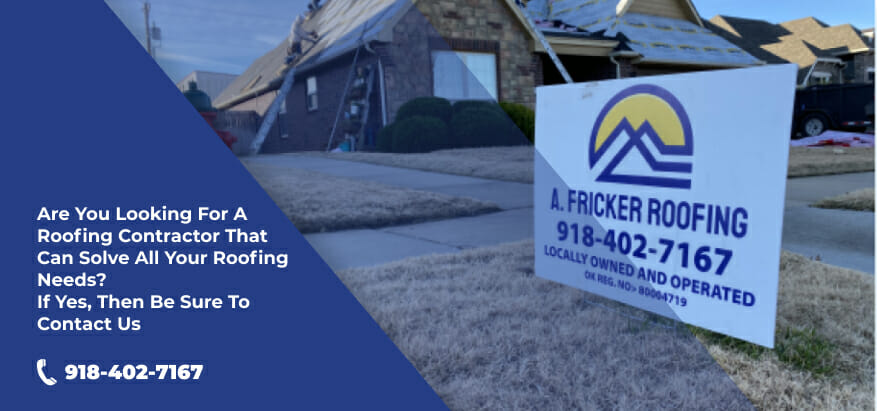When it comes to commercial buildings, choosing a suitable roofing material is crucial for long-term durability and protection against the unpredictable Tulsa weather.
As a commercial property owner in Tulsa, Oklahoma, I understand the importance of making informed decisions when it comes to maintaining and improving properties. However, with the demands of daily life, finding the time to research and explore different options can be a challenge. That’s why I’ve put together this straightforward seven-minute guide that is specifically tailored to our area to help you navigate the many different commercial roofing materials.
Whether you’re a property owner or manager, this article will serve as a valuable resource to help you understand the characteristics of popular commercial flat roof materials.
#1 TPO
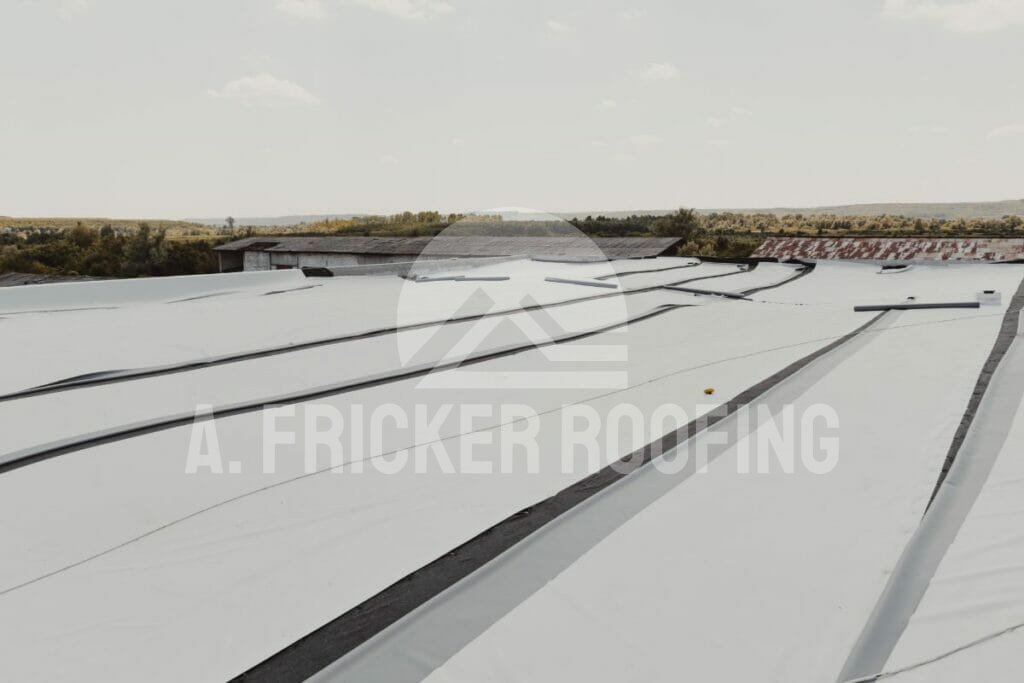
First on our list is TPO. Even if you have just started with your research, you have likely come across this commercial roofing membrane.
TPO, also known as thermoplastic polyolefin roofing, has gained significant popularity among commercial property owners in Tulsa. This is a single-ply roofing membrane that consists of a blend of polypropylene and ethylene-propylene rubber (both highly durable and synthetic materials) and offers a range of benefits for commercial flat roof buildings.
Known for its exceptional durability, energy efficiency, and straightforward installation process, TPO roofing has become a preferred choice in Tulsa, Oklahoma.
Pros:
- Excellent weather resistance, including protection against UV rays and chemical exposure.
- Energy efficient due to its highly reflective surface, TPO is usually available in white and other lighter colors, which can help to reduce cooling costs.
- Flexible and easy to install, often available in large, seamless sheets.
- Affordable compared to some other roofing materials.
Cons:
- Vulnerable to punctures, especially during installation or if sharp objects come into contact with the membrane.
- Some TPO formulations may experience heat-welded seam failure over time.
- Quality can vary among manufacturers, so it’s important to choose a reputable TPO roofing brand and a professional contractor for installation.
Suitable For:
TPO is a good choice for your flat roof if you are living in an area that usually faces high temperatures and lower levels of rainfall. If you are looking for durability or energy efficiency, TPO is a great option.
Also Read: Top 6 TPO Roofing Companies In Tulsa For Your Commercial Roofing Project
#2 EPDM
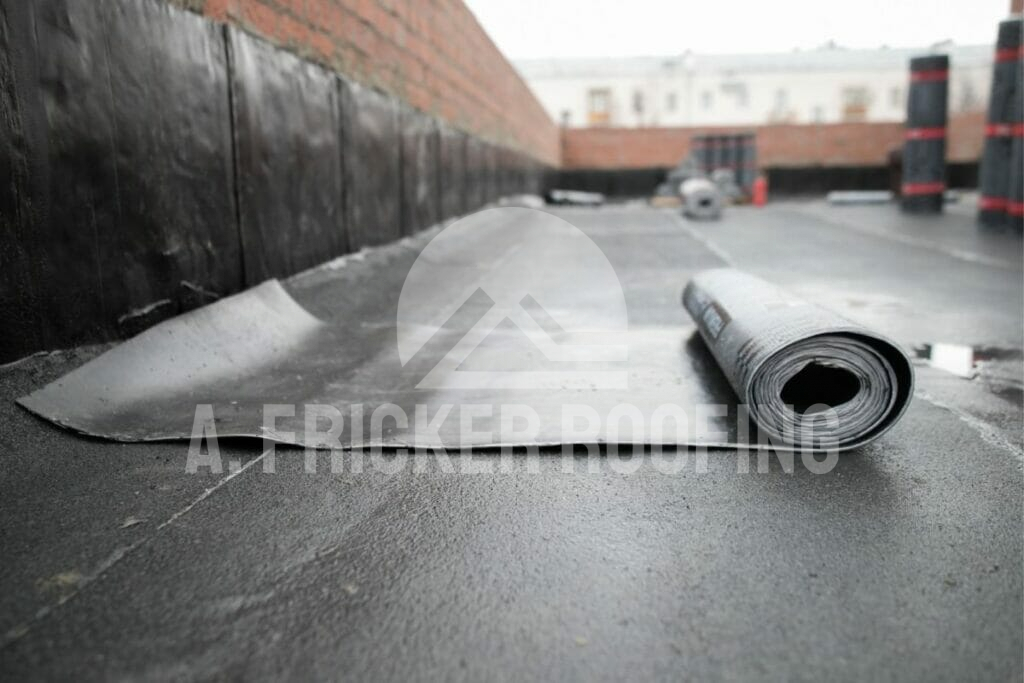
Next up is EPDM, another popular product in the commercial and flat roofing industry. The name EPDM, or ethylene propylene diene monomer, is also the name of the materials the product is made from.
EPDM roofing is a synthetic rubber roofing material commonly used on commercial properties throughout Tulsa.
This material offers a reliable solution for flat and low-sloped roofs due to its ability to withstand harsh weather conditions, including high winds and extreme temperatures.
Pros:
- Excellent durability, capable of withstanding diverse weather conditions, including storms and high temperatures.
- UV resistant, protecting against sun damage.
- Flexible and easily conforms to different roof shapes and contours.
- Low maintenance requirements, generally requiring periodic inspections and minimal repairs.
Cons:
- Vulnerable to punctures from sharp objects, requiring careful handling during installation and maintenance.
- Limited aesthetic options, EPDM roofing typically comes in black.
- Seams may require periodic maintenance and inspections to ensure integrity.
Suitable For:
It is particularly beneficial for buildings in areas prone to extreme weather conditions or for property owners seeking a low-maintenance roofing option.
#3 Metal Roof
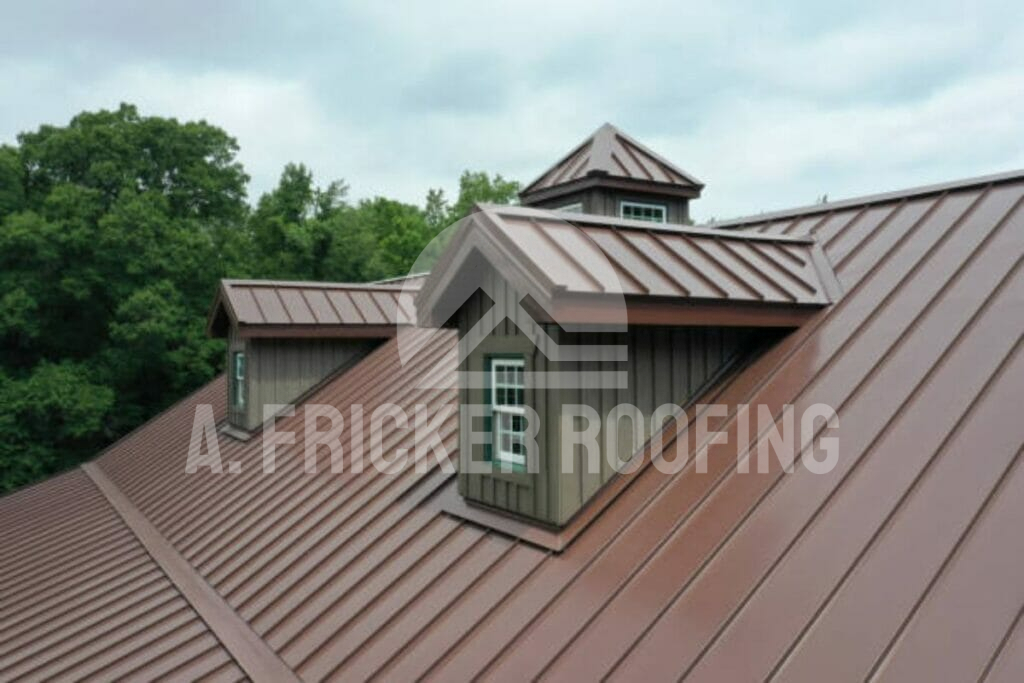
Residential roofing is not the only space where metal roofs are popular, they are a staple on commercial buildings too.
Metal roofing, renowned for its exceptional durability, stands strong as a long-lasting roofing solution for commercial properties throughout Tulsa. With its robust nature, metal roofs provide unparalleled strength and resilience against any type of weather, ensuring steadfast protection for years to come. Metal roofs come in a variety of materials, such as aluminum, steel, and copper, so you can choose one that fits your unique style. This flexibility allows business owners to find the perfect match for their architectural vision and preference.
Pros:
- Unmatched durability and longevity, often lasting 50 years or more, which is longer than most of the other commercial roofing material types
- Excellent resistance to fire, high winds, hail, and impact, perfect for Tulsa’s weather
- Metal roofs can easily reflect sunlight, and can make your property more energy efficient
- Most of the metals commonly used are durable and extremely low maintenance, allowing you to focus on running your business
Cons:
- Higher initial cost compared to some other roofing materials like TPO and EPDM
- Can be noisy during heavy rainfall or hailstorms without proper insulation
Suitable For:
A metal roof is a renowned roofing option that is suitable for most buildings and has benefits for all property owners. Go for a metal roof if you are looking for a material that can stand the test of time.
#4 Modified Bitumen
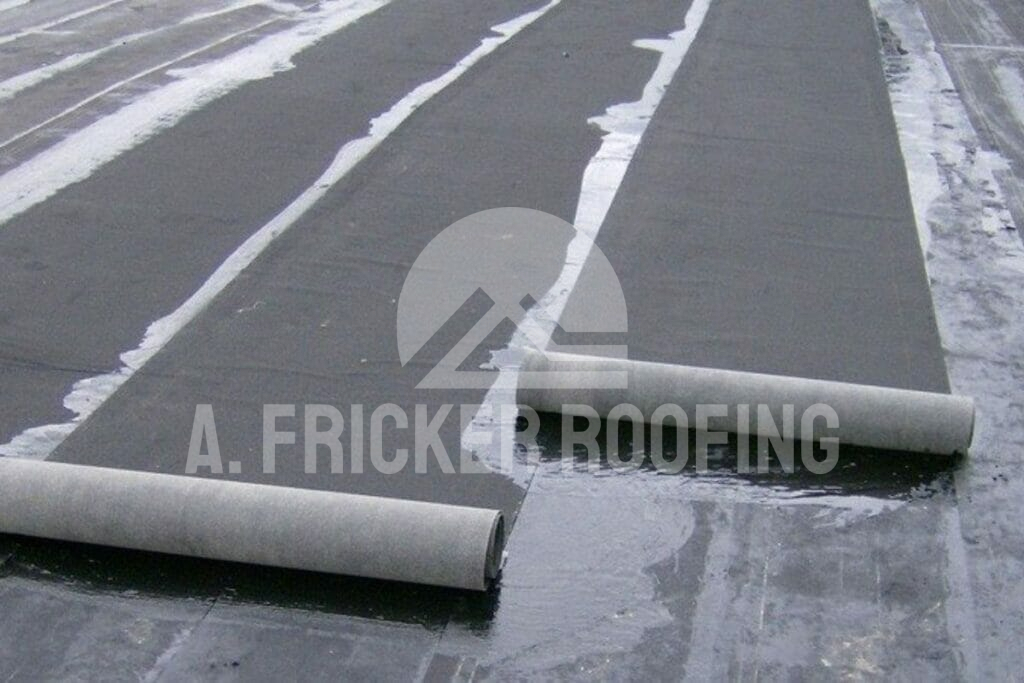
If you are looking beyond the traditional single-ply membrane roofing systems, then we have another option for you: a modified bitumen roof. Like the ever-popular asphalt shingles, modified bitumen roofs also have an asphalt base, which provides a waterproof and weather-resistant layer. However, unlike asphalt shingles, you can use modified bitumen for your flat roofing system.
This is an asphalt-based roofing system that has been modified (or enhanced) with synthetic polymers to further its performance and longevity.
This system offers a range of benefits, making it a popular choice among property owners looking for a versatile and robust solution.
Pros
- Exceptional durability and resistance to weather elements, thanks to the asphalt
- The installation process is pretty flexible, often utilizing both hot and cold adhesives, making it suitable for a variety of roof configurations
- Flexibility allows for expansion and contraction with temperature changes, minimizing the risk of cracks or leaks
- Excellent waterproofing capabilities, ensuring reliable protection against water infiltration
Cons:
- Can be more expensive than traditional asphalt roofing systems
- Requires professional installation due to the specialized techniques involved
- Regular maintenance and inspections are necessary to ensure long-term performance
Suitable For:
Modified bitumen is suitable for many commercial roof applications, however, its strongest quality is its waterproofing capability, making it best suited for commercial buildings in locations that frequently receive rain or snow.
#5 Built-Up Roof
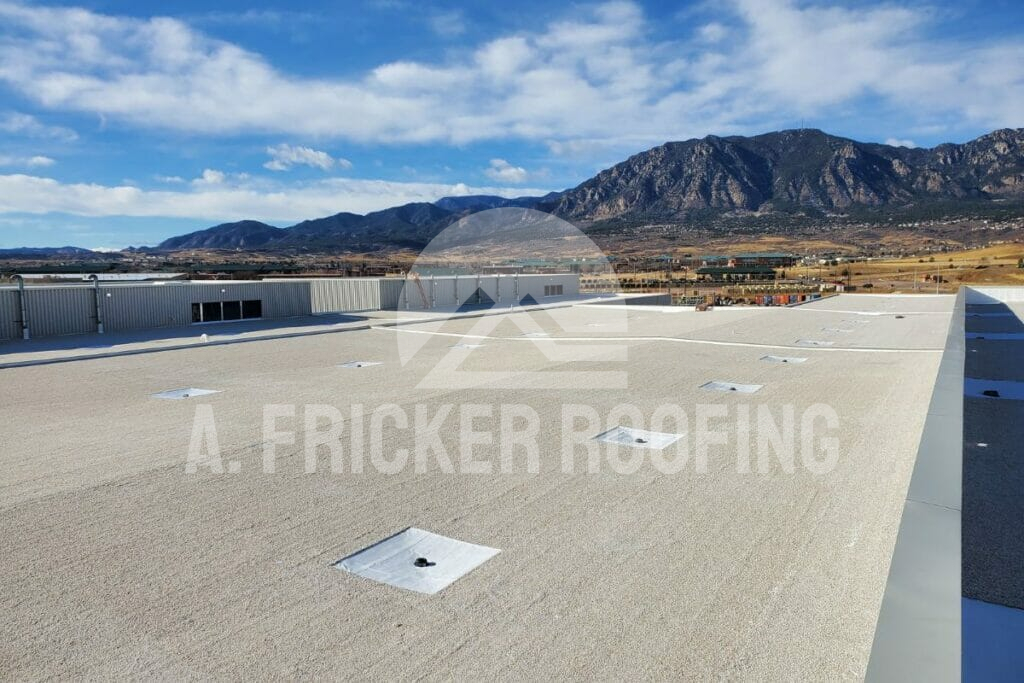
Earlier, we looked at single-ply membranes, so now let’s move on to multiple-ply roofs. Built-up roofing, commonly known as a BUR, is a traditional and time-tested multi-ply roofing system used on commercial properties throughout Tulsa.
A BUR consists of multiple layers of bitumen, alternating with reinforcement materials such as fiberglass or organic felt. This layered approach creates a robust and durable roofing system that offers reliable protection against weather elements.
The system includes a bitumen layer, insulation, reinforcement layers, and a surface layer. Since the top is usually made of gravel, this system is also often called a tar and gravel roof.
Pros:
- Exceptional durability and longevity, capable of lasting 25 to 30 years or more with proper maintenance
- Excellent reflective capabilities. A BUR has a highly reflective top layer which helps to provide reliable protection against UV rays
- A BUR can offer you flexibility as you can change the number of reinforcement layers you require
- A BUR offers exceptional flame resistance
Cons
- Heavier compared to some other roofing systems, requiring proper structural support during installation
- There can be a possibility of standing water on the roof if your area receives heavy rain
Suitable For:
BURs have been widely used for many decades. Though you may not see them as much now, they are still a good option for your roof. This is a suitable system if you want a heavy, durable membrane, especially if you get a fair amount of foot traffic on your roof.
#6 PVC Roofing System
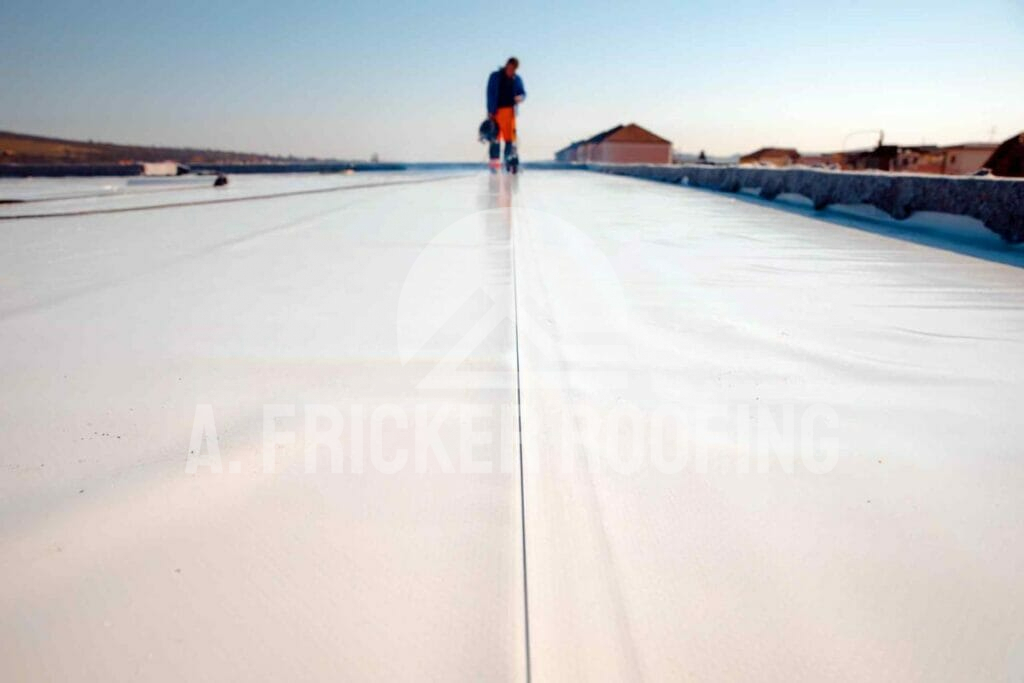
PVC roofing, also known as polyvinyl chloride roofing, is a durable and versatile commercial roofing solution that has gained popularity in the construction industry. PVC roofs are made from a synthetic plastic material that offers numerous benefits for commercial properties in Tulsa. PVC, like EPDM and TPO, is a single-ply membrane material, meaning it is available in rolls of different specifications.
PVC roofs are known for their exceptional strength, longevity, and resistance to various weather conditions. They are installed using heat-welded seams, creating a seamless, watertight membrane that protects the building from water infiltration.
Pros:
- PVC roofs are highly durable and can withstand extreme weather conditions, including high winds, hail, and UV exposure
- PVC roofing systems have excellent reflective properties, which help reduce heat absorption and keep the building cool
- They require minimal maintenance. They are resistant to mold, mildew, and algae growth
Cons:
- PVC roofing systems can have a higher upfront cost compared to other roofing materials. This is due to specialized installation techniques and high-quality materials.
- The heat-welded installation method can make repairs and replacements a bit difficult
Suitable For:
Installing a PVC roof is a good idea if you have an industrial commercial building that handles chemicals. The roofing material is chemical and fire-resistant while handling other weather conditions and UV rays well. It’s a great cool roofing option.
Want To Install A Commercial Roof? We Can Help
When it comes to installing a commercial roof that meets your specific needs and requirements, A. Fricker Roofing and Waterproofing is here to help. With our expertise and experience in the industry, we specialize in the installation of quality commercial roofing systems. Whether you’re considering TPO, EPDM, metal roofs, modified bitumen, or even exploring the benefits of green roofs, our team is equipped to provide the best solutions.
Contact us today at (918) 402-7167 and get started with a roof inspection.
